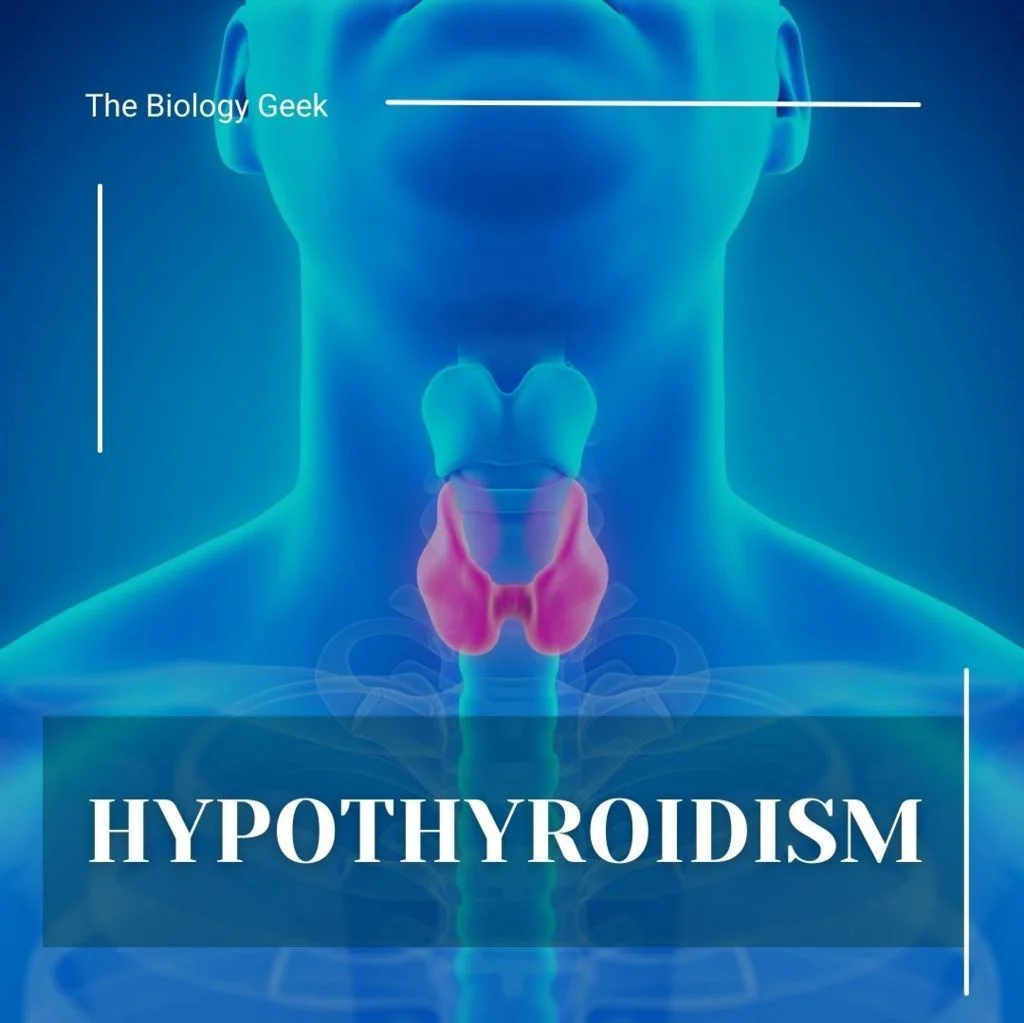Hypothyroidism:
Hypothyroidism means underactive thyroid and problems in the thyroid gland. The most common cause of primary hypothyroidism is autoimmune thyroiditis which is of two types:
- Hashimoto's thyroiditis
- Atrophic thyroiditis
What happens to a person with hypothyroidism?
Normally the immune system in our body forms antibodies that fight against foreign pathogens like bacteria and viruses but sometimes, unfortunately, the immune system forms Auto antibodies that attack the body's own tissue for example in autoimmune thyroiditis. The autoantibodies are form against the body's own thyroid gland so the thyroid gland will get inflamed.
What is the difference between Hashimoto's thyroiditis and Atrophic thyroiditis?
Hashimoto's thyroiditis is more common than atrophic thyroiditis. Hashimoto thyroiditis can be differentiated from atrophic thyroiditis by the presence of anti-TPO antibodies and a non-toxic goiter. In Hashimoto's anti-TPO antibodies are positive and there is painless swelling of the thyroid. While in Atrophic thyroiditis there are nonspecific antibodies and there will be no goiter.
What are most common Causes of hypothyroidism?
The most common cause of primary hypothyroidism is an autoimmune disease name Hashimoto’s disease. In this disease, antibodies attack the healthy tissue of own body.
Hashimoto thyroiditis:
Hashimoto thyroiditis is naming after a Japanese physician doctor Hikaru shamoto who discover it in 1912. It is found in 5% of the general population and it is more common in women than men. Also, it is also known as chronic lymphocytic thyroiditis. It is associate with other autoimmune disorders like type 1 diabetes, Addison’s disease, and celiac disease. Also, people with Down syndrome and Turner syndrome are prone to get Hashimoto's thyroiditis.
General overview of the pathophysiology of Hashimoto's thyroiditis :
In Hashimoto's thyroiditis, there are autoantibodies that are form against TPO which is the thyroid peroxidase enzyme. This enzyme is require for the synthesis of T4 and T3. So when anti-TPO antibodies are form which is also called anti-microsomal antibodies they attack the thyroid gland. The thyroid gland becomes inflamed and there is lymphocytic infiltration in the thyroid gland.
They become a trough feed over time so now the thyroid gland will be unable to produce T4 and T3. So their levels will be low. These low levels of thyroid hormones will report back to the pituitary gland and the pituitary gland will produce more TSH, trying to compensate for the lower levels of T4 and T3.
What are the symptoms of hypothyroidism?
There are many functions of thyroid hormones in our body. So, hypothyroidism affects the patient’s body and will cause these symptoms:
- Memory impairment
- Forgetfulness
- A hairy-looking white patch on the side of the tongue
- Not attentive behavior
- Dry skin
- Brittle hair
- Hypothermia due to which the patient will have cold intolerance. This hypothermia also leads to fluid retention in the body. So, it causes
- Puffy eyes
- Pitting edema
- Goiter
- The enlargement of the thyroid gland
- Muscle weakness aches and pains
- Fatigue
- Low heart rate
- Constipation due to decreased PMR
- Weight gain in female
- Heavy menstrual bleeding
- Anemia
- Hyperlipidemia and hyperglycemia because thyroid hormones are responsible for fat metabolism and carbohydrate metabolism and that reduce hypothyroidism.

Diagnosis:
Some physicians however do ultrasounds of the neck to see if there are any nodules or any infiltration of disease of the thyroid gland. Also, they check the level of T4 and T3 with different tests.
What are the treatment options for Hashimoto's thyroiditis?
Different treatments are use to treat hypothyroidism that is:
- Medical treatment like post-surgery of the thyroid gland or radioactive iodine treatment or after some drugs like lithium iron and Mizzou carbon is mostly use.
- The doctor prescribes levothyroxine which is basically a synthetic T4. It is a small tablet once daily a patient has to take 30 minutes before breakfast or any other medication because they can interfere with its absorption. The dose ranges between 25 to 250 micrograms. However, it is generally given according to the patient's weight which is almost 1.6 to 1.7 micrograms per kg, and the general clinical condition of a patient for example if a patient comes with severe hypothyroidism then the doctor can start directly with a high dose, and then try to eat it slowly until he becomes patient thyroid.
- Also, patients who have heart failure doctor should start with the lowest dose which is 25 micrograms. The doctor checks the TFTs level after 6 to 8 weeks until the patient becomes stable. Unfortunately, Hashimoto's thyroiditis is a chronic condition so levothyroxine shall be given as a lifelong treatment.
- Surgery is not require in hypothyroidism unless the goiter becomes so large that it compresses the trachea, esophagus, and larynx , causing difficulty in breathing, difficulty in swallowing, and hoarseness of the voice respectively.
- In pregnancy thyroxine is completely safe in fact doctors have to increase the rows of thyroxine in pregnancy due to increasing demand for the body serum. TSH level should be check in each trimester and then six to eight weeks. Postpartum breastfeeding is also safe while the patient is on thyroxine.
What are the three types of hypothyroidism?
There are three types
- Primary hypothyroidism
- Secondary hypothyroidism
- Tertiary hypothyroidism
Secondary hypothyroidism and tertiary hypothyroidism are very rare in clinical practice. Secondary hypothyroidism is due to the failure of the pituitary gland to secrete TSH due to a pituitary tumor. While tertiary hypothyroidism is due to the failure of the hypothalamus to secrete a thyrotropin-releasing hormone (TRH).
Where does hypothyroidism occur? and where it is mostly found?
Iodine is require for the synthesis of thyroid hormones so it definitely may lead to hypothyroidism. It is present in people who live in mountainous regions where food is growing in poor soil.